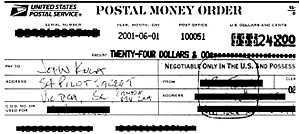Every once in a while, someone will ask me why I prefer to receive personal checks from the USA, rather than money orders. But most of the time, people just ignore me, and send me a money order anyway, in the misguided belief that it will speed up the transaction.
Over the past ten years, I have bought and sold merchandise over the Internet with a total value in five figures, most of which came from or went to the USA. In those hundreds of transactions, only two checks bounced: the very first one I received (and I had some concerns about it, but not enough practical experience) and one other that caused much more embarrassment to the sender, who was and still is a major fixture in wargaming.
On the whole, then, my experience with checks has been very positive.
Unlike many American banks, my bank has learned over the years that I may be eccentric, but Iím also harmless. They provided me with an American dollar account, and they donít levy a service charge for cashing US checks or for buying money orders in American dollars.
As a consequence, an American check transaction is just as quick and painless for me as a cash transaction.
A little-known fact about money orders is that itís almost as easy to stop payment on one as it is to stop payment on a check, so theyíre really no more reliable a financial instrument, despite a reputation otherwise.
To this point, then (and please bear in mind that Iím discussing only the cashing of American checks and money orders in Canada, and not Canadian checks and money orders in the USA), checks and money orders would appear to be equal.
And in fact, up to about two years ago, my bank treated them about equally. But itís clear from talking with people at the bank that eBayís influence has spread to our financial institutions. My bank is no longer able to pull the wool over American banksí eyes.
You see, up to a few years ago, it would appear that my American account had one of the largest number of transactions in the city, and when I cashed the occasional American money order, my bank was able to pass it on without difficulty. But the recent increase in American funds transactions due to eBay has meant that American financial institutions are becoming much more legalistic, and are returning improper money orders.
So, what precisely is an ďimproperĒ money order? Well, you see, there are actually two types of money order available for purchase by Americans. One type is negotiable only within the USA, and the other is negotiable internationally.
The default, if not specified at the time of purchase (and how many Americans know that they should be asking for the international money order) is the money order negotiable only within the USA.
And if that money order is sent to me, my bank will no longer honor it, so I have to return it to the sender.
 As an example, look at the money order illustrated. Iíve censored certain
sensitive information, but clearly visible (and it is printed in red, too) is the
notation: ďNegotiable only in the U.S. and PossessionsĒ. My bank can no longer
convince its American compatriots that Canada is a Possession of the USA, and
the all-too-obvious failure of the Quebec Referendum on separation makes it clear
that Canada is not a state. The Americans are just getting too smart for us.
As an example, look at the money order illustrated. Iíve censored certain
sensitive information, but clearly visible (and it is printed in red, too) is the
notation: ďNegotiable only in the U.S. and PossessionsĒ. My bank can no longer
convince its American compatriots that Canada is a Possession of the USA, and
the all-too-obvious failure of the Quebec Referendum on separation makes it clear
that Canada is not a state. The Americans are just getting too smart for us.
This has been a long and convoluted explanation of why I prefer personal checks instead of money orders from the USA. Now you understand why Iíve been unwilling to discuss it on an individual basis. Clearly, itís nothing personal, and anyway the information is likely to be of value to most Americans, as eBay shows all the signs of becoming larger and more international in scope.
Now, have you ever wondered why I insist that any parcels being sent from the USA to me in Canada be sent by U.S. Postal Service, and not by a courier service?
Back to Simulacrum Vol. 3 No. 4 Table of Contents
Back to Simulacrum List of Issues
Back to MagWeb Master Magazine List
© Copyright 2001 by Steambubble Graphics
This article appears in MagWeb (Magazine Web) on the Internet World Wide Web. Other military history articles and gaming articles are available at http://www.magweb.com